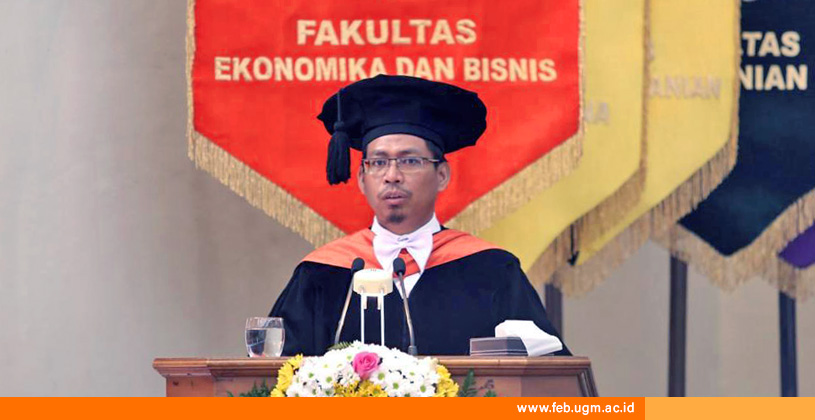Inauguration of Professor of Accounting, Prof. Mahfud Sholihin, M.Acc., Ph.D
- Details
- Written by Kirana
- Category: News
- Hits: 1373

The inauguration of Prof. Mahfud Sholihin, M.Acc., Ph.D., in the field of accounting was officially held on Wednesday (8/06), which coincided with his birthday. The event took place offline at the Senate Hall of the University of Gadjah Mada (UGM) and was also broadcasted live on UGM’s Youtube channel. Mahfud Sholihin became one of 353 active professors at UGM and 42 active professors at Faculty of Economics and Business (FEB) UGM. Prior to his appointment as a Professor, Mahfud Sholihin completed his undergraduate studies at the accounting study program at FEB UGM, took a master's degree in accounting at the University of Western Australia, and earned a Doctor of Philosophy (Ph.D) degree at the University of Bradford, England.
In front of the audience, Mahfud Sholihin delivered an inaugural speech titled as “Innovation in Learning Business Ethics and the Accounting Profession in the Digital Era.” Mahfud Sholihin chose that as its title because there are still many ethical issues in the business world and the accounting profession, both at home and abroad. Business schools, including FEB UGM, must play a role in creating ethically prospective accountants, business people, and leaders. As part of this effort, it is necessary to develop various innovative ethics courses in accordance with the mission of FEB UGM, which is integrity and quality teaching.
Based on his speech, the study of business ethics and the accounting profession still currently faces various challenges. Previous research noted that accountants have lower moral reasoning compared to other professionals. Accounting undergraduate students are considered less concerned with ethical issues compared to undergraduate students from other departments. There is a notion going around that accounting is unrelated with ethics and can only be viewed as a technical problem.
In relation to these challenges, many inputs arise suggesting to develop effective and efficient learning methods so that students have skills in decision-making and ethical behavior, not merely an understanding of ethical theories. On the other hand, in this digital era, there are also challenges of changing learning styles, especially for undergraduate students who are dominated by the millennial generation and generation Z, who are digital natives. Therefore, it is not enough to just come up with something effective and efficient. Teachers of business ethics and the accounting profession are required to find learning models and delivery methods that are also attractive and interactive.
According to Mahfud Sholihin, one of the learning models and delivery methods that will answer those issues is behavioral simulation. Simulation-based learning of business ethics and accounting profession is ethical learning that provides concrete practical experience and represents business problems in the real world. Mahfud believes that behavioral simulation can increase student involvement more deeply in learning by playing the role of decision makers. “In the context of learning business ethics and the accounting profession, behavioral simulation aims to improve skills, confidence, and practice the development of ethical decisions," he explained.
With the development of technology, simulation-based learning designs are easier to develop and implement, one of which is by using augmented reality (AR) or virtual reality (VR) technology which will provide an interesting experience. Mahfud Sholihin and friends have developed three applications based on computer and telecommunications technology for learning business ethics and the accounting profession, two using AR and one using VR. These applications are available free of charge for smartphones and can be used to give experience to decision making as well as provide an understanding of the theory related to ethics.
One of the applications developed using AR by Mahfud and friends is “Who Wants to be Ethical?” which provides an overview to students about whistleblowing cases that occured in real companies in Indonesia. The application has been tested on 147 students and the test results show that the use of behavioral simulation can increase moral imagination, which is an antecedent of ethical sensitivity.
Meanwhile, the application developed using VR is called “Auditor's Dilemma,” which simulates the player as an auditor who is faced with ethical dilemmas that may often be encountered by real-life auditors. The results of the trial on accounting students in Yogyakarta stated that the learning process using VR was motivating, interesting, and increased the effectiveness of learning as well as the level of student ethical efficacy.
At the end of the speech, Mahfud Sholihin concluded that ethical values must be instilled in the younger generation so that cases of business fraud, especially financial scandals, do not recur. AR and VR technology is a promising technology and can be used for learning business ethics and the accounting profession effectively and efficiently.
Reportase: Kirana Lalita Pristy.


